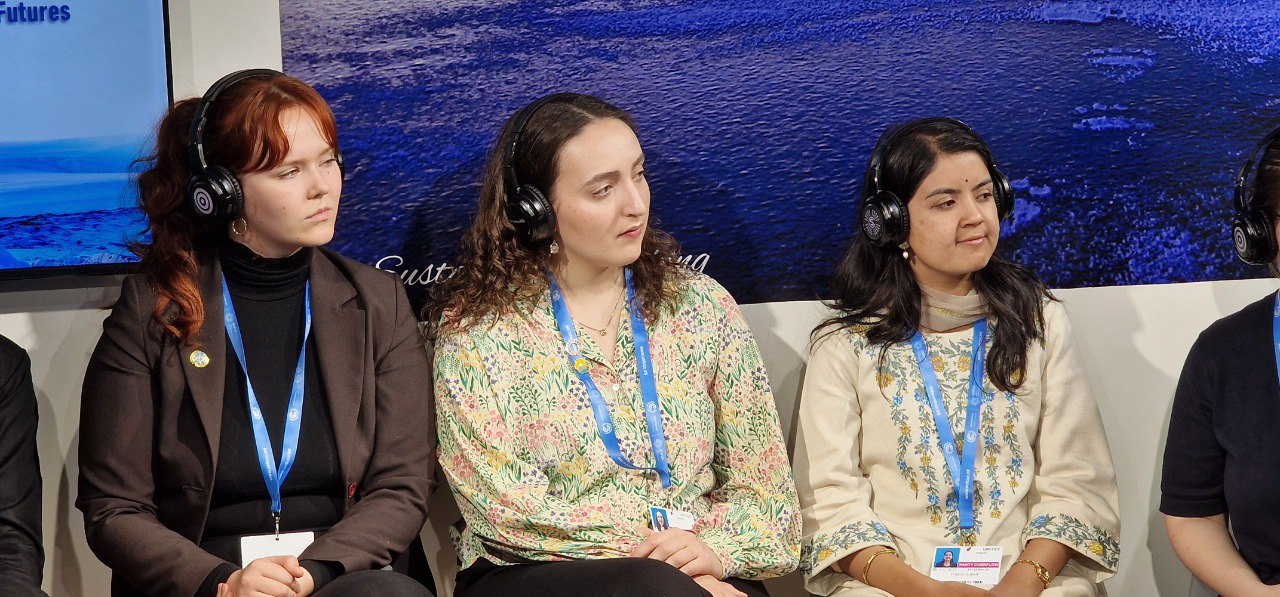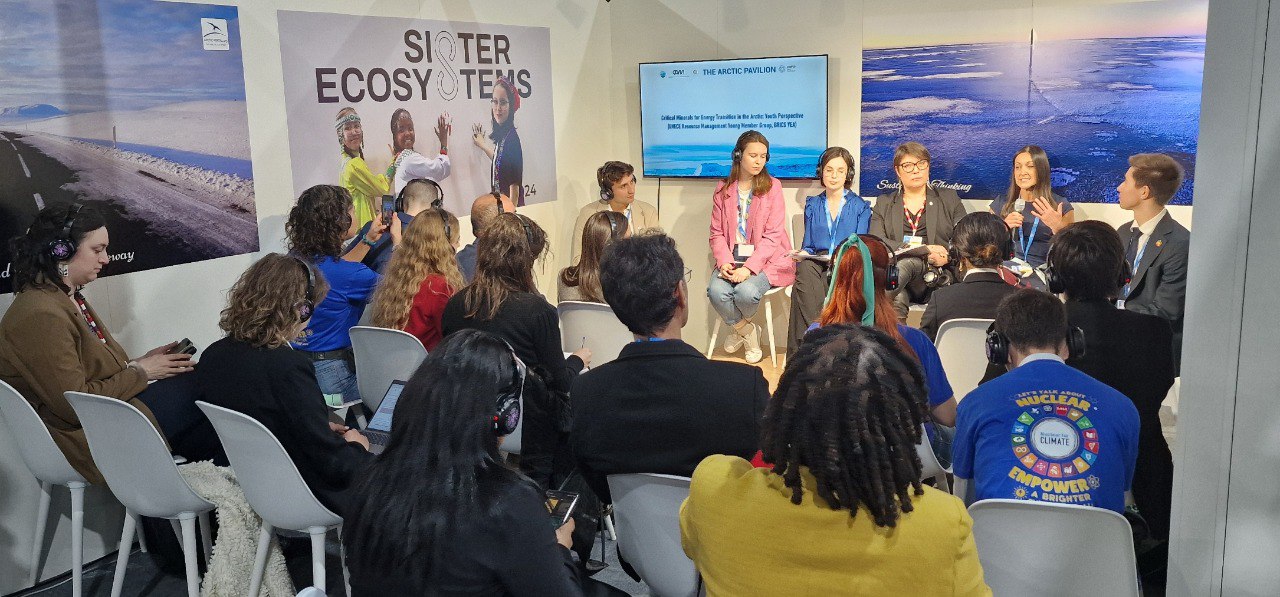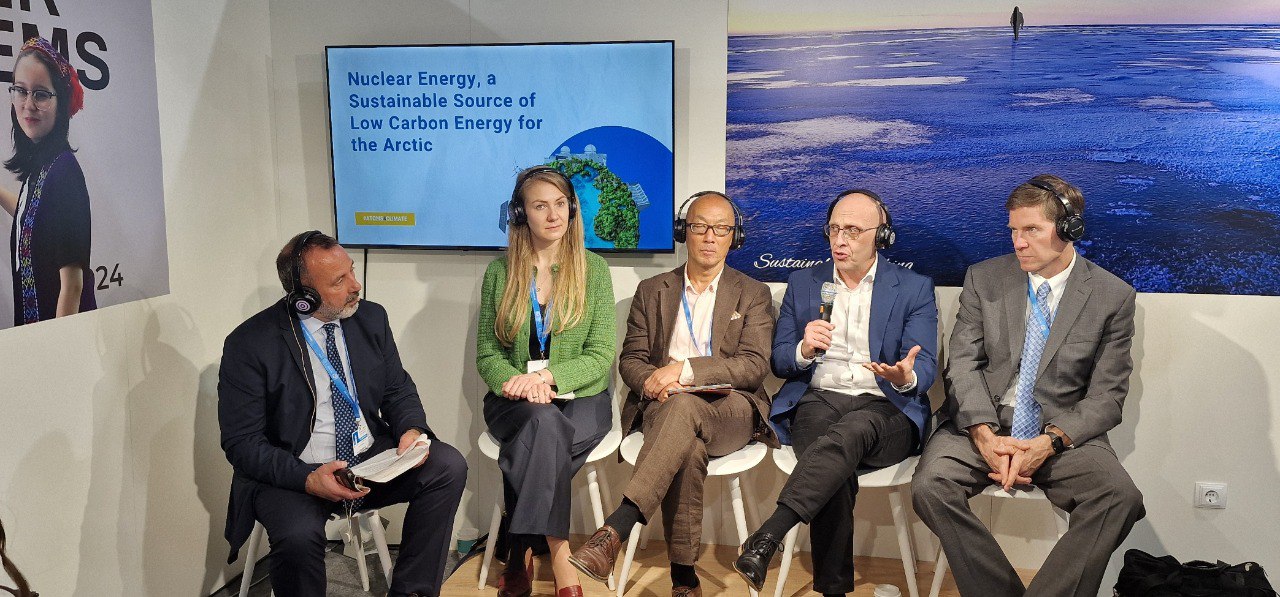
The fifth day of the the 29th Conference of the Parties (COP29) of the United Nations Framework Convention on Climate Change (UNFCCC) at the Arctic Pavilion began with the session «Standards and Skills: What is needed to manage critical minerals for the energy transition?».
We are halfway through the Energy Transition, with a trillion invested in the past few decades, and the next trillion expected in the next four years (RMI, 2024). While countries and corporations have set ambitious 2050 targets, we face a critical challenge: a lack of skilled workforce to deliver on these goals. Now is the time to invest in people, as they are essential to achieving collective climate objectives. The session addressed these and other important issues in providing human capital for the transition.

Today also saw the launch of a report commissioned by the non-governmental organisation Climate Analytics on the role of northern forests in climate change mitigation. A panel discussion on the results and findings of the report was held with government representatives, NGOs, scientists and indigenous peoples. The main message is that northern forests play a key role that is often not seen or appreciated. In particular, the boreal forests of the Arctic contain huge amounts of carbon in their soils, and protecting these forests is a key element of any global climate change mitigation strategy.

Climate Forward from Pakistan hosted the second session at the Arctic Pavilion, «Climate Connect: Bridging Arctic and South Asia for Sustainable Futures». The experts agreed that we need to learn from each other's experience and share innovative solutions to achieve sustainable development on the planet as a whole. We will keep in active contact with them, increasing the multicultural value of the Northern Forum, which is open to all countries.

Arsenii Kirgizov-Barskii, program coordinator of the Arctic Pavilion led the session «Critical Minerals for Energy Transition: Intergenerational Perspective». Climate change is a global challenge that requires a significant shift towards low-carbon energy technologies. However, current climate and energy policies remain highly resource-intensive: it is expected that by 2040, the demand for critical minerals will increase fourfold if the world is on track to achieve net zero. If managed responsibly, critical minerals might become a new backbone of sustainable economic growth, benefiting communities in the Arctic. This challenge reminds us again of the pressing need for international cooperation with intergenerational equity at its core. The main idea behind this event is to make the energy transition in the Arctic truly clean and just, while embedding intergenerational equity in resource management.

The Arctic Pavilion hosts very serious sessions of the world's largest associations. Experts from the International Atomic Energy Agency (IAEA), the Canadian Nuclear Association (CNA), the Nuclear Energy Institute (NEI) and the World Nuclear Association (WNA) hosted a session on «Nuclear Energy, a sustainable source of low carbon energy for the Arctic». Globally nuclear power provides just under a quarter of all low-carbon electricity – and according to the latest IAEA projections, the installed capacity is set to increase by up to 150% by 2050 to about 950 GW. An important newbuild effort is needed, and the IAEA sees small modular reactors (SMRs) potentially representing 24% of all new nuclear capacity put online by the middle of the century. In addition to electricity, SMRs can also provide heat – as in the case of the Floating Nuclear Power Plant Akademik Lomonosov in north-eastern Siberia.

Arsenii Kirgizov-Barskii also led the concluding session of the pavilion on Arctic and Amazonian Indigenous Youth Dialogue ahead of the next Conference of the Parties in Brazil. In both the Arctic and the Amazon, indigenous peoples and local communities play a crucial role in managing much of the biodiversity, maintaining nature-centred knowledge and values accumulated over generations.
On November 11-22, the Northern Forum is hosting the first-of-its-kind Arctic Pavilion at the UN Climate Change Conference (COP29) in Baku, Azerbaijan. The general partner of the Arctic Pavilion is the Melnichenko Foundation, the youth partner is the BRICS Youth Energy Agency. More info: https://arcticpavilion-cop.org
Watch live-streaming of all sessions on the Northern Forum Youtube channel.


